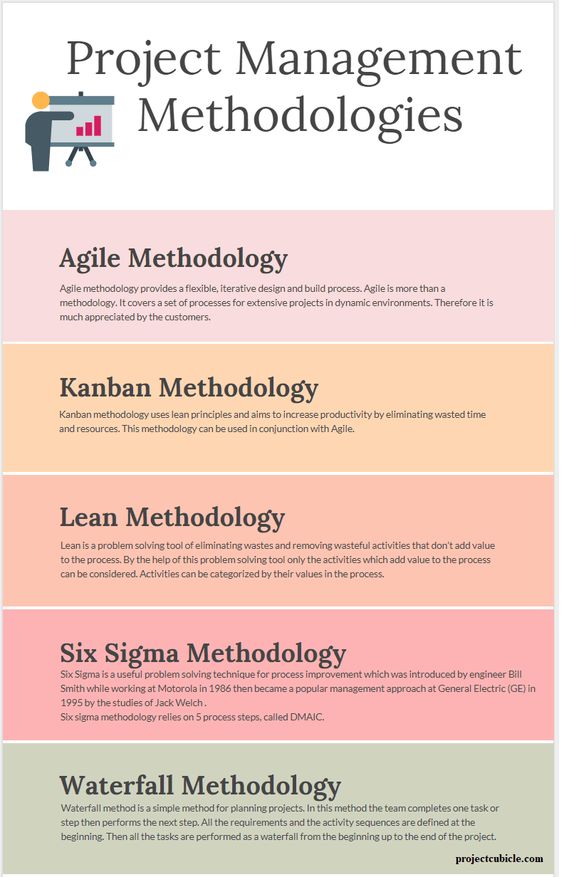Project management methodologies and tools play a crucial role in the success of any project. With the rise of digitalization and global connectivity, businesses and organizations of all types and sizes require more efficient project management methods to stay competitive in today’s fast-paced work environment. By selecting and implementing the right project management methodology and tools, businesses can streamline their workflow, save time and money, and ensure the timely completion of projects. In this article, we will review the most commonly used project management methodologies and highlight the top tools for each.
Traditional Project Management Methodology
The Traditional Project Management Methodology, also known as the Waterfall model, is a linear, sequential approach to project management. This approach divides the project into a series of discrete stages, starting with planning, followed by design, development, testing, deployment, and maintenance. Each stage is completed in a chronological order, and progress is made only after the completion of the preceding stage. This methodology is suitable for projects where the requirements are well-defined and the scope is limited. The most popular tool for this methodology is Microsoft Project.
Agile Project Management Methodology
Agile Project Management Methodology is a highly flexible iterative approach that prioritizes customer communication, short development cycles, and continuous improvement. Agile is best suited for projects where requirements are constantly changing and where speed is essential. Teams work in short iterations, known as sprints, to achieve specific goals and deliverables. The most popular tool for this methodology is Jira.
Scrum Project Management Methodology
Scrum Project Management Methodology is a subset of the broader Agile methodology. It is a highly collaborative approach that emphasizes team communication, transparency, and feedback. The team works together to complete a series of sprints within a timeboxed period known as the scrum cycle. This methodology is ideal for software development projects, and the most widely used tool for this is Trello.
Kanban Project Management Methodology
Kanban Project Management Methodology is a visual approach to project management that uses visual cards or boards to represent work items. It focuses on limiting work in progress (WIP) and optimizing the flow of work through the system. Kanban is ideal for teams that have a high volume of work, limited resources, and a constant flow of change requests. The most popular tool for this methodology is Asana.
Lean Project Management Methodology
Lean Project Management Methodology is a systematic approach that aims to reduce waste, improve customer value, and increase efficiency. It is based on the principles of continuous improvement, elimination of non-value-adding activities, and respect for people. This methodology is suitable for projects that have direct customer involvement and where the value stream can be optimized. The most popular tool for this methodology is LeanKit.
Critical Path Method (CPM)
Critical Path Method (CPM) is a project management technique that seeks to optimize the sequence of activities based on their duration and dependencies. CPM is used to identify the critical path or the longest sequence of activities that determines the overall duration of the project. By focusing on the critical path, teams can optimize their schedule and resources to ensure timely project completion. The most popular tool for this methodology is GanttProject.
Program Evaluation and Review Technique (PERT)
Program Evaluation and Review Technique (PERT) is a project management technique that is similar to CPM but places more emphasis on risk analysis and contingency planning. PERT uses probabilistic estimates of activity durations, rather than fixed durations, to determine project completion time. By accounting for uncertainties in the project planning phase, teams can develop more realistic schedules and contingency plans. The most popular tool for this methodology is PERT Chart EXPERT.
You might find these FREE courses useful
- Scrum Master Certification Practice
- Scrum Master Certification Exam Preparation
- Scrum Master Certification: Scrum Methodologies
- Scrum Master Certification Specialization
PRINCE2 Project Management Methodology
PRINCE2 Project Management Methodology is a structured organizational approach to project management. It is based on seven principles, themes, and processes that guide project management from initiation to closure. The methodology emphasizes the importance of clear roles and responsibilities, documented procedures, and controlled change management. PRINCE2 is widely used in the UK public sector and is gaining popularity in other countries. The most popular tool for this methodology is PRINCE2 software.
In conclusion, the success of a project depends on the effective selection and implementation of the appropriate project management methodology and tools. By understanding the strengths and weaknesses of different methodologies, teams can select the one that best suits their project’s goals, requirements, and resources. Using the right tools in conjunction with a well-defined methodology can help teams streamline their workflow, improve communication, and enhance the overall quality of their project deliverables.
